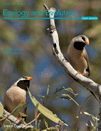
Ecology and Evolution
Scope & Guideline
Exploring the dynamic interplay of life and environment.
Introduction
Aims and Scopes
- Ecological Interactions and Processes:
Research focused on understanding the dynamics of species interactions, community assembly, and ecosystem functioning, particularly in response to environmental changes. - Evolutionary Biology and Genetics:
Studies that explore the genetic basis of evolutionary changes, speciation processes, and the role of evolutionary mechanisms in shaping biodiversity. - Conservation and Biodiversity:
Investigations aimed at understanding the factors influencing biodiversity loss and the effectiveness of conservation strategies, particularly in the face of anthropogenic pressures. - Phylogenetics and Systematics:
Research that utilizes molecular and morphological data to resolve phylogenetic relationships and evolutionary histories among taxa. - Adaptation and Phenotypic Plasticity:
Studies examining how organisms adapt to environmental changes and the genetic and ecological factors that contribute to phenotypic variation. - Microbial Ecology and Evolution:
Research that addresses the roles of microorganisms in ecological systems and their evolutionary dynamics, including host-microbe interactions.
Trending and Emerging
- Environmental DNA (eDNA) Applications:
There is a marked increase in studies utilizing eDNA techniques for biodiversity monitoring and conservation, reflecting advancements in genetic methodologies and a shift towards non-invasive research methods. - Climate Change Impacts on Biodiversity:
Research examining the effects of climate change on ecological dynamics and evolutionary processes is trending upwards, indicating a heightened awareness of global environmental changes. - Urban Ecology and Human-Wildlife Interactions:
The exploration of ecological dynamics in urban environments and the interactions between humans and wildlife is gaining traction, highlighting the relevance of ecological research in anthropogenic landscapes. - Functional Ecology and Trait-Based Approaches:
An increasing focus on functional traits and their ecological implications is evident, as researchers seek to understand how traits influence species interactions and ecosystem functions. - Microbiome Studies in Ecology and Evolution:
Emerging research on the role of microbiomes in ecological and evolutionary contexts is becoming more prevalent, suggesting a growing recognition of the importance of microbial communities in shaping host biology.
Declining or Waning
- Paleoecology and Historical Biogeography:
There has been a noticeable decrease in publications focusing on paleoecological studies and historical biogeographical analyses, possibly due to a shift towards contemporary ecological and evolutionary research. - Physiological Ecology:
Research exploring physiological adaptations in relation to ecological contexts appears to be less frequently published, suggesting a potential gap in understanding the physiological underpinnings of ecological interactions. - Invasive Species Dynamics:
Although still relevant, studies specifically focusing on the dynamics of invasive species have become less prevalent, perhaps overshadowed by broader conservation and biodiversity themes. - Traditional Taxonomy:
The traditional approaches to taxonomy, particularly those that do not incorporate molecular techniques, seem to be declining as molecular phylogenetics becomes more dominant.
Similar Journals

CONTRIBUTIONS TO ZOOLOGY
Discovering New Horizons in Animal EcologyCONTRIBUTIONS TO ZOOLOGY, published by BRILL, is a premier scholarly journal dedicated to advancing the field of zoological sciences. With an ISSN of 1383-4517 and an E-ISSN of 1875-9866, this journal serves as a vital platform for researchers, professionals, and students seeking to share their findings and insights related to animal science, ecology, evolution, and systematics. Recognized for its high academic standards, it ranks in the top quartile (Q1) for Animal Science and Zoology, and Q2 for Ecology, Evolution, Behavior, and Systematics, reflecting its significance and influence in the scholarly community. The journal has been consistently published since 1994 and continues to contribute pivotal knowledge that informs and shapes contemporary zoological research. Researchers can access the journal through traditional subscription models, ensuring broad dissemination of its impactful articles and studies. Contributions to Zoology plays an essential role in fostering collaboration and discussion within the zoological community in the Netherlands and beyond.

OIKOS
Connecting scholars to inspire ecological and evolutionary breakthroughs.OIKOS is a leading journal dedicated to the field of Ecology, Evolution, Behavior, and Systematics, published by WILEY in the United Kingdom. Since its inception in 1973, OIKOS has established itself as a vital platform for researchers seeking to advance their understanding of ecological interactions and evolutionary processes, with its impact reflected in its prestigious Q1 classification in the 2023 Scopus rankings. The journal's dedication to high-quality research is exemplified by its robust ranking of #106 out of 721 in the relevant categories, situating it within the top 15% of journals globally. With a commitment to disseminating influential findings, OIKOS encourages the open exchange of ideas among a diverse range of scholars, making it an essential resource for academics, professionals, and students alike. Whether you are interested in innovative ecological theories or applied research with real-world implications, OIKOS provides a rich repository of knowledge to inform and inspire your work.

Annual Review of Entomology
Advancing the Frontiers of Insect ScienceAnnual Review of Entomology, published by Annual Reviews, is a premier journal dedicated to advancing the understanding of entomology through comprehensive review articles from leaders in the field. With a focus on Ecology, Evolution, Behavior, and Systematics and Insect Science, the journal ranks in the top quartile (Q1) as of 2023, reflecting its significant impact and relevance in these disciplines. Based in the United States, the Annual Review of Entomology has been a trusted resource since its inception, providing critical insights that inform research, policy, and education in entomology. Researchers and professionals will find valuable reviews that synthesize current knowledge and highlight future directions in insect research. The journal's impressive standing, as indicated by its rankings—first in both Agricultural and Biological Sciences categories—emphasizes its pivotal role in shaping scientific discourse and innovation.
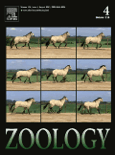
ZOOLOGY
Publishing impactful research for a deeper understanding of wildlife.ZOOLOGY, an esteemed journal published by Elsevier GmbH, stands at the forefront of research in the Animal Science and Zoology fields. With a notable impact factor and recognized as a Q1 category journal in its discipline, ZOOLOGY is highly regarded among researchers, ranking #98 out of 490 in Scopus rankings. Founded in 1994 and continuing through to 2024, the journal aims to publish cutting-edge, peer-reviewed articles that contribute significantly to the understanding of zoological sciences. Based in Munich, Germany, ZOOLOGY provides both subscription and open access options, ensuring that influential research reaches a wider audience. It serves as an essential platform for disseminating innovative findings, connecting scholars globally, and fostering interdisciplinary collaboration to advance zoological knowledge.

Frontiers in Ecology and Evolution
Unveiling the complexities of life through ecology and evolution.Frontiers in Ecology and Evolution, published by FRONTIERS MEDIA SA, stands as a premier open-access journal dedicated to the exploration and discourse in the interdisciplinary fields of ecology and evolutionary biology. With its inception in 2013, this journal has rapidly ascended to a prestigious position, securing a Q1 ranking in both Ecology and Ecology, Evolution, Behavior and Systematics categories, reflecting its influential impact in the respective fields. Operative from Switzerland, Frontiers in Ecology and Evolution enables researchers, professionals, and students to access high-quality research without barriers, promoting collaboration and innovation. The journal covers a broad range of topics, from ecological dynamics to evolutionary strategies, facilitating profound insights that drive scientific advancement and understanding. With a remarkable position in Scopus rankings—ranking #218 in Ecology, Evolution, Behavior and Systematics and #145 in Environmental Science—this journal is essential for anyone keen on contributing to or staying updated with contemporary research in ecology and evolution.
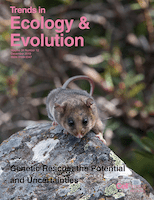
TRENDS IN ECOLOGY & EVOLUTION
Synthesis of Cutting-edge Research in Ecology and EvolutionTRENDS IN ECOLOGY & EVOLUTION, published by CELL PRESS, is a premier academic journal dedicated to the dynamic fields of ecology, evolution, and behavior. With its ISSN 0169-5347 and E-ISSN 1872-8383, this prestigious journal has consistently contributed to the scientific community since its inception in 1986 and is set to continue its legacy through 2024. Ranked in the top quartile (Q1) of its category in 2023, TRENDS IN ECOLOGY & EVOLUTION holds an extraordinary position, sitting at rank #4 out of 721 in the Scopus database for Agricultural and Biological Sciences, specifically within the Ecology and Evolution sectors, reflecting its high impact and relevance in these critical areas of study. The journal's objective is to provide a platform for reviewing and synthesizing the latest research, trends, and advances, thereby influencing the direction of future scientific inquiries. Although it does not currently offer open access options, its insights are invaluable for researchers, professionals, and students eager to delve into the rapidly evolving understanding of ecological and evolutionary processes.
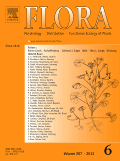
FLORA
Innovating Research in Ecology and Plant StudiesFLORA is a distinguished journal published by Elsevier GmbH, focusing on the realms of Ecology, Plant Science, and Evolutionary Biology. Established in 1975, this journal has been a vital platform for researchers and professionals, disseminating groundbreaking findings and insights relevant to the plant sciences. With an impressive impact factor and a current Scopus ranking placing it in the second quartile (Q2) across multiple categories, FLORA is recognized as a critical resource for advancing knowledge in its respective fields. The journal publishes both traditional research articles and significant review papers, ensuring a broad spectrum of academic engagement. Although not open access, FLORA remains committed to enhancing the scientific discourse and fostering collaboration among scholars worldwide. Researchers seeking to enrich their understanding of ecological dynamics and plant biology will find FLORA to be an essential addition to their academic repertoire.
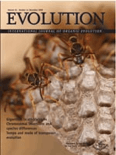
EVOLUTION
Exploring the Dynamics of Life and AdaptationEVOLUTION is a premier academic journal published by Oxford University Press, dedicated to the dynamic fields of evolutionary biology, ecology, and genetics. Since its inception in 1948, the journal has established itself as a leading platform for innovative research and critical analyses, achieving a remarkable impact factor that reflects its significance in the scientific community. EVOLUTION is consistently ranked in the Q1 category across key disciplines, including Agricultural and Biological Sciences, Ecology, and Genetics, making it a vital resource for researchers and practitioners alike. With an impressive Scopus ranking placing it in the 79th percentile for Agricultural and Biological Sciences and the 78th percentile for Ecology and Evolution, the journal is essential reading for those seeking to stay at the forefront of evolutionary studies. Although the journal does not currently offer open access options, it remains a crucial vehicle for disseminating cutting-edge research that influences the understanding of biological processes and their implications in diverse ecosystems. The commitment to rigor and excellence ensures that EVOLUTION continues to shape the discourse in evolutionary science and related fields.

INTERNATIONAL JOURNAL OF PLANT SCIENCES
Connecting researchers with groundbreaking plant studies.The INTERNATIONAL JOURNAL OF PLANT SCIENCES, published by UNIV CHICAGO PRESS, is a leading journal dedicated to advancing knowledge in the fields of plant sciences and ecology. With an ISSN of 1058-5893 and an E-ISSN of 1537-5315, this journal has been a prominent platform for groundbreaking research since its establishment, featuring works from 1983 to present. It holds an impressive Q2 ranking in both Ecology, Evolution, Behavior and Systematics and Plant Science, reflecting its reputable standing within the academic community. The journal is well-regarded for its rigorous peer-review process and commitment to high-quality publication standards, making it a favored choice for researchers, students, and professionals eager to engage with the latest findings and innovative methodologies in plant research. While it does not currently operate under an Open Access model, the journal provides ample access options for institutions and individuals keen to explore its curated content. By presenting diverse studies that blend theoretical and practical insights, the INTERNATIONAL JOURNAL OF PLANT SCIENCES plays a critical role in fostering interdisciplinary dialogue and advancing the frontiers of plant science research.
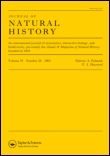
JOURNAL OF NATURAL HISTORY
Pioneering Insights into Natural SystemsThe Journal of Natural History, established in 1967, is a pivotal academic resource published by Taylor & Francis Ltd. With an ISSN of 0022-2933 and an E-ISSN of 1464-5262, this journal is a cornerstone in the field of Ecology, Evolution, Behavior, and Systematics. Ranked Q2 in its category as of 2023, it stands out with a Scopus ranking of #477 out of 721, reflecting its influence and relevance, particularly in the agricultural and biological sciences. The Journal of Natural History aims to disseminate high-quality, peer-reviewed research that contributes to our understanding of biodiversity and ecosystem dynamics. Although it does not operate under an open-access model, this journal remains accessible through various academic libraries and platforms, making it an essential resource for researchers, professionals, and students striving to advance their knowledge in natural history. With its long-standing commitment to excellence, the journal plays a crucial role in shaping discourse and fostering innovation in ecological research.